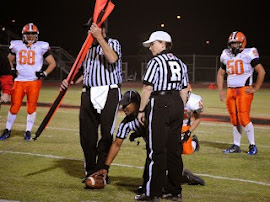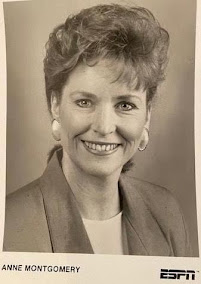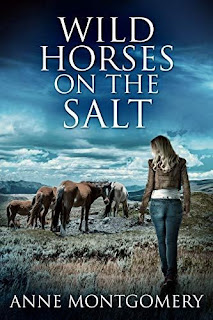by Anne Montgomery
I became a sports official to learn about the games so that I might become a competent sportscaster. It seemed like a good idea, and yet, during my 15-year reporting career, I never met any other officials who became broadcasters.
A long time ago, back when I hoped to earn a paycheck in front
of a TV camera, I had what I thought was a moment of brilliance. Why, I opined,
wouldn’t TV networks want to hire sports officials and put them in the
broadcast booth? The idea seemed like a win-win.
Of course, I was a tad biased. I had taken five years and learned to officiate five sports: football, baseball, ice hockey, soccer, and basketball. All with the hope that my new-found on-field expertise might wrangle me a job as a sportscaster. While blowing whistles and calling balls and strikes did eventually help me get my foot in the sports journalism world, I never in 15 years as a reporter meet any other broadcasters from the officiating ranks.
When I was a SportsCenter anchor at ESPN, I suggested
it might be a good idea to put former officials in the broadcast booth. My
colleagues thought I was crazy.
Fast forward to today, where former officials are now miced up and sharing their thoughts on calls with the viewing public. That makes me want to hop into Mr. Peabody’s Wayback Machine and confront my old colleagues at ESPN.
“It would be great,” I explained in the newsroom back in 1990. “You could put officials in the booth and they could explain why certain calls were made."
Crickets.
My remarks, as I recall, were met by head shakes indicating that I was certainly out of my mind. Who would ever want to listen to sports officials speak? They intimated.
Fast forward thirty years and there they are, with the NFL leading the way. Former officials and now rules analysts Mike Pereira, Dean Blandino, and Terry McAulay, among others. Then there’s Gene Steratore, who along with his 15-year NFL career spent 20 years calling college basketball games and is now an analyst for both sports.
The question is, what took the networks so long? Sports rules
are complicated. Don’t believe me? Ask someone to explain what constitutes a
catch is in football. Or the reasoning behind and execution of an infield fly
in baseball. Or the difference between a foul ball and a foul tip. Or when
icing is waved off in hockey. Or how to tell a charge from a block in
basketball. Or what constitutes traveling. Oh, wait. No one calls that anymore.
While fans might better understand their favorite sports by listening to former officials in the booth, maybe they're happier just arguing about the rules.
Anyway, if you don’t believe me, pick up a rule book. Just read one page. I dare you. Rules and their corresponding diagrams can sometimes look like hieroglyphics with descriptions written by folks from MENSA. So why not hire people who study those books for a living? Then they can dumb down the rules to make them more digestible to the viewing public.
Then again, many fans thrive on controversy and arguing about calls is high on their list of entertaining things to do. Maybe if they actually understood the rules, some of the fun might be drained out of sports fandom.
As a purist, I think it's better to truly understand the rules, but since I spent four decades as an amateur official, I'm clearly more than a little biased.
Here is a peek at one of my women's fiction novels. I hope you enjoy it.
A woman flees an abusive husband and finds hope in the wilds of the Arizona dessert.
Rebecca Quinn escapes her controlling husband and, with nowhere else to go, hops the red-eye to Arizona. There, Gaby Strand – her aunt’s college roommate – gives her shelter at the Salt River Inn, a 1930’s guesthouse located in the wildly beautiful Tonto National Forest.
Becca struggles with post-traumatic stress, but is enthralled by the splendor and fragility of the Sonoran Desert. The once aspiring artist meets Noah Tanner, a cattle rancher and beekeeper, Oscar Billingsley, a retired psychiatrist and avid birder, and a blacksmith named Walt. Thanks to her new friends and a small band of wild horses, Becca adjusts to life in the desert and rekindles her love of art.
When she can, Anne indulges in her passions: rock collecting, scuba diving, football refereeing, and playing her guitar.
Learn more about Anne Montgomery on her website and Wikipedia. Stay connected on Facebook, Linkedin, and Twitter.





No comments:
Post a Comment